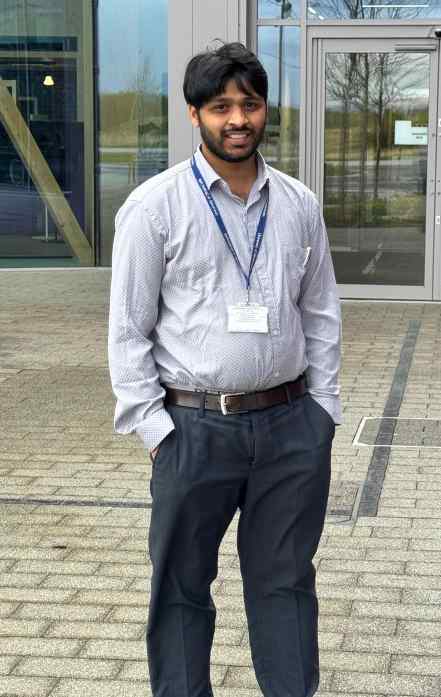MSc Mechatronics & Automation Hemanth Babu Dhulipalla
Hemanth Babu Dhulipalla came to Glasgow from his home country of India to study on the MSc in Mechatronics & Automation programme at Strathclyde. After enjoying his time at Strathclyde so much he decided to continue his studies, and is now a PhD student in the Department of Design, Manufacturing & Engineering Management.
Find out more about what he has enjoyed about his time at Strathclyde, and what encouraged him to continue his studies at Strathclyde.
What were your reasons for deciding to study to gain a master’s degree?
It has always been my mother’s dream to see me become a scientist, and my father has also aspired to see me grow and succeed in my life. Since childhood, I have been walking in that direction, motivated by their aspirations for me.

What made you want to pursue your MSc studies outside your home country?
My personal experience has shown me that the highly competitive environment in my home country of India can impact a person's creativity and innovation skills. This realisation motivated me to travel far from my beloved country, despite the additional challenges that came with making this choice.
Why did you choose to study at Strathclyde for your MSc?
The structure of the MSc in Mechatronics & Automation at Strathclyde is unique, with only two or three other universities in the entire UK offering similar kinds of course. Strathclyde recognised my previous academic excellence and offered substantial financial support for my Masters, which greatly influenced my decision.
What facilities have you had access to during your studies?
I have utilised the 3D printing and virtual reality facilities in my Department of Design, Manufacturing & Engineering Management (DMEM). My MSc thesis focuses on confidence in 3D sketching using virtual reality (VR). I explored how introducing 3D modeling through VR, as opposed to conventional CAD applications, affects designers' reflections and how it benefits and limits them.
Are you part of any groups or societies?
I have been part of Hear to Listen, the Strathclyde International Students' Association (SISA), and I also served as a faculty representative for the Faculty of Engineering for postgraduate students.
Currently I am part of the Doctorial Research Group as well as Strathclyde Institute for Sustainable Communities (SISC) group.
What are the highlights you have found about studying in your department?
The Department of DMEM organises industrial group projects every year as part of the MSc curriculum. This provides a valuable opportunity to work with industry experts, such as those from Spirit AeroSystems.
It allows us to gain practical experience in teamwork, client handling, and even navigate small conflicts within the team, which are fond memories.
What made you decide to continue your studies at Strathclyde with PhD study?
I am exploring options for a suitable and challenging project that has a significant impact on humankind. My PhD research focuses on the safety and integrity of aeroengine components, which remain a primary concern in the modern aviation industry, especially in light of recent issues with engine failures in landing gear and turbine disks. This motivated me to continue my studies in Strathclyde.
What has been your favourite aspect of studying at Strathclyde?
One of my favourite aspects has been working with industry leaders by presenting my work at tech board meetings. I appreciate the opportunity to receive and handle critiques from clients, as well as learn from my mistakes through practical experience.
What are your ambitions for the future, and how do you think your time at Strathclyde will help you achieve your goals?
I aspire to become a scientist addressing global challenges. I believe that collaborating with industry partners within my work in the University’s Advanced Forming Research Centre (AFRC) provides a solid pathway to achieve this goal.
Would you recommend Strathclyde to other people and why?
Yes, I would definitely recommend Strathclyde. I encourage prospective students to have a clear understanding of their career aspirations so they can maximise their learning experience and effectively utilise the internationally equipped facilities available.
Any other comments you would like to add?
Strathclyde, the Department of DMEM, the AFRC, and the National Manufacturing Institute Scotland (NMIS) are excellent places to learn and grow. I encourage everyone to make the most of their time here and embrace the opportunities for personal and professional development.